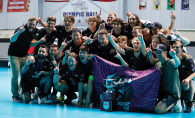As a child, memories of playing ball with mom and dad can be some of the simplest and most joyful. What Woodbury resident Frank White didn’t realize, however, was that when he played catch with his dad, Lou “Pud” White, he was playing with one of the greats.
White had known that his father played for the black baseball teams in Minnesota, called the Twin Cities Colored Giants, in the 1940s and 50s but, he says, “My dad was … If you talk to people about men of that age, men didn’t really talk a lot. They didn’t show emotion.” So his father hadn’t told him any details about his past until White took him to an event at the Minnesota History Center on black baseball. He was standing with his father and some of his father’s old friends and they were talking about the Negro Baseball League, which was the professional league for black players. “So I’m standing there and the guy standing next to me … he says, ‘You know they used to come and get your dad to play.’” Confused, White asked for clarification and the man told him the Negro League teams would ask White’s father to play for them.
“I knew my dad was good, but this guy said, ‘Your dad was really good,’” White says. So on the drive home, White told his dad what he learned and asked, “‘How come you never told me?’ He said, ‘It wasn’t important.’”
But White knew it was important, and he started researching not only his father, but black baseball in Minnesota. “I really never had a plan to do a book,” he says. “And I never had a plan to do an exhibit.” White spoke at an event on black baseball and a man told him he should talk to the Ramsey County Historical Society (RCHS) about doing more. So in December 2009 he met with Mollie Spillman, who said, “Some people called us and said you wanted to do an exhibit.’” White knew nothing of this, but he decided to jump on board and the exhibit opened three months later in February 2010.
He continued researching and wrote an article for the RCHS quarterly magazine. The article went on to win several awards and the editor came to White with the idea of writing a book. He had already done the exhibit when he hadn’t planned to do so, and White was losing steam. “But then I thought about it, and I’d been fortunate to watch my father play [and] talk to his friends after his death. All these guys have passed away so a lot of their stories—I figured if I don’t tell them, they’re gone forever.”
He started his research for an exhibit in 2009; his book, They Played for the Love of the Game: Untold Stories of Black Baseball in Minnesota, was published by the Minnesota Historical Society (MNHS) Press in February 2016.
Josh Leventhal, acquisitions editor at the MNHS Press, says they wanted to publish White’s book because “[The book] is such a key piece in understanding the history of Minnesota, its diverse people, and its complex past. Far more than a baseball story, it is a story of a community, and it explores a dimension of Minnesota history that too often is ignored.”
The book uncovers those stories and includes information from the 1880s to today, and though he had some help from other books that covered the early years, White sat in the History Center and flipped through newspapers. “I’ve looked at newspapers—African American newspapers and some of the daily newspapers—but most of the African American newspapers from 1885 to the 1960s,” he says. “They’re all weekly newspapers, so 52 weeks a year times a minimum of six pages and I literally went through every page.”
What White found in his research were some things he already knew: The St. Paul Colored Gophers was a professional team and the national black champions in 1909. Another team, the Minneapolis Keystone Tigers, became the Gophers’ rivals. But he found out about other teams, too.
“In the ‘20s, there was another great rivalry between the Uptown Sanitary Shop and a team called the Askin and Marine Red Sox,” he says. And new information popped up along the way as friends and acquaintances came to him with clippings and photos. Someone came to him with a team photo from 1923, and White was, at first, disappointed because he had already seen the photo. “But on the photo it had some arrows pointing to some guys with some names,” he says. It was through these trails of breadcrumbs that he was able to put together a full picture of black baseball history.
He also learned a bit more about his father, like the fact that he won the conference batting title at the Mechanic Arts High School in 1946. “He hit .600,” White says. “It’s still a record today.” And the fact that he was recruited by the Yankees, but turned them down.
The stories of White’s father and his friends, and events, like discrimination in small towns, that White himself remembers, make this more than just a baseball book. “The personal connections and experiences that Frank brings to the book make for a compelling lens for sharing these stories,” Leventhal says. And the stories may revolve around baseball, but in truth they are the history of Minnesota.
It is a history that continues today, one that White says he experiences in his job as the coordinator for the Reviving Baseball in Inner Cities (RBI) program for the Minnesota Twins. Now the goal is to show African American kids that baseball and softball are just as exciting as basketball and football.
But he remains hopeful, and brings that hope to Woodbury, his and his wife’s new hometown. They moved because they needed more space; they picked Woodbury because it’s quiet, they’re near a park, and “it was a good community that also appeared to embrace diversity,” White says. “At the end of the day, I want [my wife and I] to come home to a safe place. While my roots are in St. Paul, we’ve found a home and neighborhood that we enjoy.”
Author and historian Frank White now makes his home in Woodbury.

(Photo by Joel Schnell)









